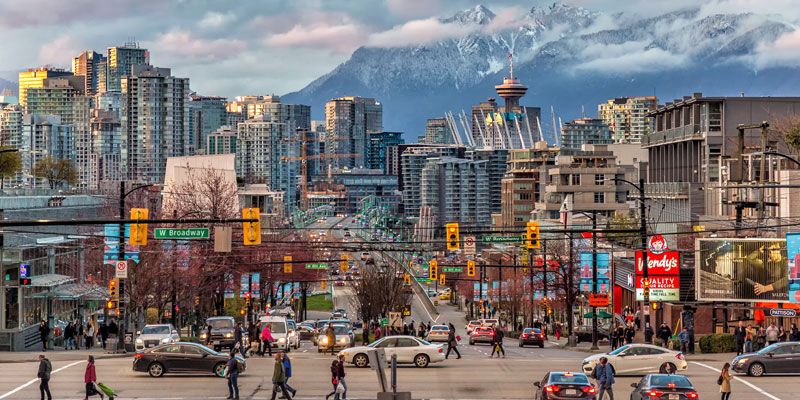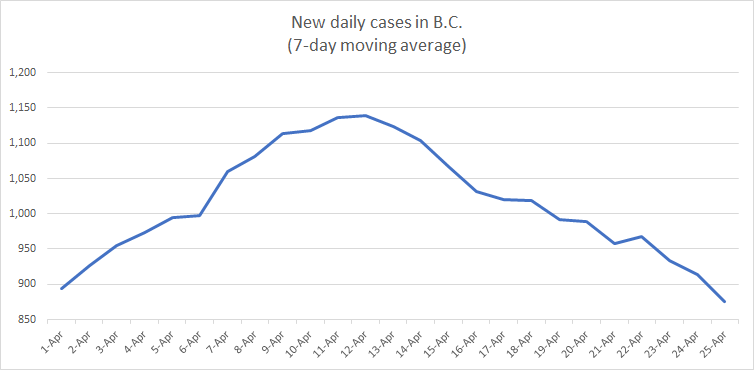B.C. government imposes travel restrictions while COVID numbers fall

Last week, Premier John Horgan imposed travel restrictions in British Columbia under the province’s Emergency Program Act. Specifically, the order restricts people from travelling outside their “region” (i.e. Lower Mainland, Interior or Vancouver Island) for non-essential purposes to help stop the spread of COVID-19. And yet, according to the government’s own data, new and active COVID-positive cases in the province are actually declining.
The new travel restrictions are the latest in a long chain of restrictions over the past six months. After enjoying the summer and early fall with our "safe six" bubbles, the Horgan government enacted sweeping new restrictions after new case counts increased in October.
In November, the government banned social gatherings with people outside households (indoor and outdoor) and announced a mandatory mask mandate while also discouraging “non-essential” travel outside of our communities.
Despite the growing stringency, we’ve seen a second wave come and go, the emergence of a third wave, and thankfully now appear to be on the downward side of that wave. Put differently, since September, new daily COVID cases in B.C. have increased, decreased, increased and are now falling again. Yet there’s little to no discussion about the actual effectiveness of social restrictions in the media.
But it’s not hard to understand why daily COVID cases rise, fall, rise and start falling again with the same social restrictions in place. People change their behaviour as the information they receive changes. When new cases increase significantly, the risks they face change, they grow more cautious and change their behaviour. That’s true for increases in new cases, hospitalizations and deaths. The change in behaviour is what helps change the new daily case counts. That’s likely what’s happening now, which should raise questions about the travel restrictions.
What’s most troubling, however, is that in recent months the B.C. government has eased and tightened social and travel restrictions in a what economists call a “countercyclical” manner. That is, when new daily positive COVID cases increase, the government eases restrictions. When case counts fall, it tightens them. At best, government restrictions have been a lagged response, coming on the heels of individual British Columbians realizing risk and making autonomous self-correcting behavioural choices.
Consider that on March 11 of this year, after four months of severe restrictions on social gatherings, the Horgan government allowed British Columbians to gather outside in groups of up to 10 people—at a time when the seven-day moving average of new daily positive COVID cases was actually increasing significantly. Specifically, from the middle of February, the average of new daily positive COVID cases increased from approximately 400 per day to approximately 525 per day by March 11 when the government eased social restrictions. Don’t take my word it. Check out the graph (data from February 15, 2021 to March 11, 2021) on the government’s own BC Centre for Disease Control COVID-19 Epidemiology App.
Which brings us back to Premier Horgan’s latest travel restrictions, which the government imposed while its own data show COVID cases declining (specifically, the seven-day moving average of new daily positive COVID cases has been decreasing since April 12). Again, don’t take my word for it, look at the chart from the government’s own site (data from April 1, 2021 to April 25, 2021) as illustrated below.

These data from B.C., which raise questions about the effectiveness of restrictions, comport with a growing body of evidence that empirically tests and questions the efficacy of lockdowns and social and travel restrictions, particularly through a cost-benefit analysis. For example, see The Failed Experiment of Covid Lockdowns, The Case against Lockdowns or COVID-19: Rethinking the Lockdown Groupthink.
Canadians should welcome research examining the effectiveness of social and travel restrictions as we continue to battle COVID and learn lessons for future pandemics and viral outbreaks. The governments in B.C. and Ottawa would do well to carefully examine these lessons from outside jurisdictions.
Regardless of what you think about the effectiveness of social and travel restrictions, all British Columbians ought to question why the government is easing and tightening restrictions in a countercyclical manner to the actual spread of the virus.

